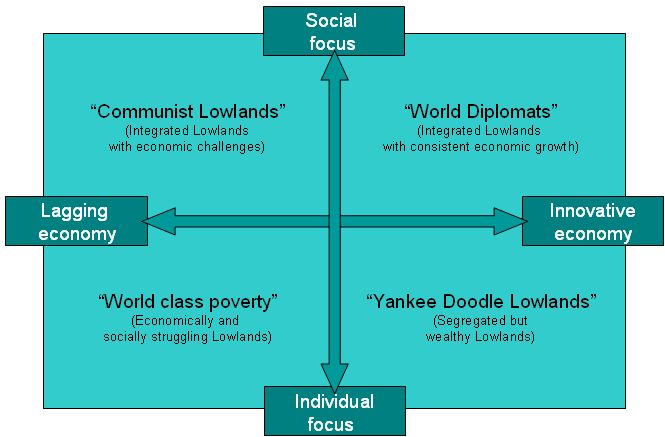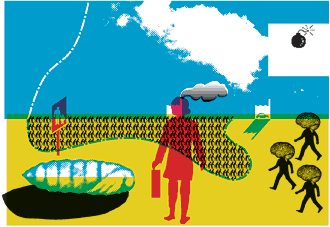Difference between revisions of "The future of the Lowlands in 2025"
| (91 intermediate revisions by 8 users not shown) | |||
| Line 1: | Line 1: | ||
[[Image:D3701NF1.gif]]<br><br> | |||
== Introduction == | == Introduction == | ||
'''The future of the | '''The future of the Lowlands in 2025''' | ||
Everywhere around the Western world, the events of 9/11 have triggered the start of significant changes in societies. While the exact impact has been different for individual countries, an increased sense of physical and social insecurity has been shared among most of the Western world countries. | Everywhere around the Western world, the events of 9/11 have triggered the start of significant changes in societies. While the exact impact has been different for individual countries, an increased sense of physical and social insecurity has been shared among most of the Western world countries. In The Netherlands, this effect of increased insecurity was further pronounced by the liquidations of Pim Fortuyn (2003) and Theo van Gogh (2004): both politically motivated murdering acts, which had not been experienced in The Netherlands since the beheading of Van Oldenbarnevelt in medieval ages. | ||
These changes have given rise to heated debates within the wider society about amongst others the critical importance of freedom of speech versus openness and respectful behaviour towards other cultures. Looking | These changes have given rise to heated debates within the wider society about amongst others the critical importance of freedom of speech versus openness and respectful behaviour towards other cultures. Looking at the Dutch: once a proud and outward (sea-)faring nation, they have long been famous for their tolerance, multicultural interests and their openness to publicly discuss and accept what may appear morally challenging dilemmas in other countries (such as e.g. the use of drugs, euthanasia etc.), which now appears to be gradually but fundamentally changing over time. The recent Dutch ‘No’ against the newly proposed European Constitution may only signal a symbolical start of what could turn out to be a profound and apocalyptic change in the history of The Low Lands when looking back at history in 2025… | ||
'''Strategic dilemma: ‘Where to for | '''Strategic dilemma: ‘Where to for the Lowlands?’''' | ||
From this introduction, the strategic dilemma faced by the | From this introduction, the strategic dilemma faced by the Lowland societies can be framed as:‘Where to for Lowlands: a change from (focus on) integration to ultimately disintegration and segregation?’ | ||
<br> | |||
== Four Scenarios == | |||
<br> | |||
<table> | |||
<tr> | |||
<td>[["Communist Lowlands"]]</td> | |||
<td></td> | |||
<td>[["World Diplomats"]]</td> | |||
</tr> | |||
<tr> | |||
<td></td> | |||
<td>[[Image:Lowlands_2025_Scenarios.jpg]]</td> | |||
<td></td> | |||
</tr> | |||
<tr> | |||
<td>[["World Class Poverty"]]</td> | |||
<td></td> | |||
<td>[["Yankee Doodle Lowlands"]]</td> | |||
</tr> | |||
</table> | |||
<br><br> | |||
Scenario document: [http://scenariothinking.org/wiki/images/6/65/Group_assignment_Future_of_the_Lowlands_EMBA05.pdf Four Scenarios] | |||
<br><br> | |||
== System Diagram == | |||
http://scenariothinking.org/wiki/images/4/41/Systems_diagram_final_Lowlands_2025.ppt | |||
<br> | |||
== Driving Forces == | |||
'''Political'''<br> | |||
[http://scenariothinking.org/wiki/index.php/Global_Labour_Market Global Labour Market]<br> | |||
[http://scenariothinking.org/wiki/index.php/Global_Terrorism Global Terrorism]<br> | |||
[http://scenariothinking.org/wiki/index.php/Islamic_Fundamentalism Islamic Fundamentalism]<br> | |||
[http://scenariothinking.org/wiki/index.php/Increase_of_concentration_of_non-western_immigrants_%28in_Lowlands%29 Increase of concentration of non-western immigrants in the lowlands]<br> | |||
[http://scenariothinking.org/wiki/index.php/Increase_of_international_conflicts_against_muslims Increase of international conflicts against Muslim countries] <br> <br> | |||
'''Societal'''<br> | |||
[http://scenariothinking.org/wiki/index.php/Aging_population Aging Population]<br> | |||
[http://scenariothinking.org/wiki/index.php/My_job_is_not_the_only_thing_in_my_life_ANYMORE%21%21%21%21 Life in balance]<br> | |||
[[Increasing influence of Millennials]]<br> | |||
<br> | |||
'''Technological''' <br> | |||
[http://scenariothinking.org/wiki/index.php/Decrease_in_investments_in_R%26D Decrease in R&D investments in the Netherlands]<br> | |||
[http://scenariothinking.org/wiki/index.php/Decrease_of_Technology_Students Decline in the numbers of high-tech skilled employees] | |||
<br><br> | |||
'''Economical''' | |||
<br> [http://scenariothinking.org/wiki/index.php/Decrease_of_revenues_in_lowlands_from_national_gas_fields Declining revenues from national gas fields in The Netherlands] <br><br> | |||
== Research == | |||
'''Research topics''' | |||
<br> | |||
[[Research topics]] | |||
<br><br> | |||
'''Research performed''' | |||
<br> | |||
An extensive research has been conducted to the forces which might impact the future of the Lowlands. Only a limited number of these forces have been used as driving forces in the scenarios (see above). | |||
<br> | |||
The total research is presented in the following document: | |||
<br> | |||
[http://scenariothinking.org/wiki/images/5/53/Future_of_the_Lowlands_in_2025_-_Research_Driving_Forces.pdf Research Driving Forces] | |||
<br> | |||
<br> | |||
'''Original research question''' | |||
<br> | |||
[[Original research question]] | |||
<br><br> | |||
== Articles, Concepts, Links == | |||
[http://www.cpb.nl/eng/pub/bijzonder/55/bijz55_summary.pdf Four Futures for the Netherlands] | |||
<br> | |||
[http://www.rivm.nl/bibliotheek/rapporten/408129027.pdf Lange Termijn bevolkingsscenario's voor Nederland] | |||
<br> | |||
[http://www.vrom.nl/pagina.html?id=2706&sp=2&dn=4196 De Toekomst als inspiratiebron] | |||
<br> | |||
[http://epp.eurostat.cec.eu.int European Statistics] | |||
<br> | |||
[http://www.cbs.nl/nl-NL/menu/cijfers/statline/toegang/default.htm Statline] | |||
<br> | |||
[http://scenariothinking.org/wiki/images/3/35/Bijz55_summary.pdf Four futures of the Netherlands] | |||
<br> | |||
[http://scenariothinking.org/wiki/images/e/e2/LT-bevolking.pdf Long-Term Population scenario's for the Netherlands] | |||
<br> | |||
<br> | <br> | ||
Latest revision as of 19:57, 6 December 2021
Introduction
The future of the Lowlands in 2025
Everywhere around the Western world, the events of 9/11 have triggered the start of significant changes in societies. While the exact impact has been different for individual countries, an increased sense of physical and social insecurity has been shared among most of the Western world countries. In The Netherlands, this effect of increased insecurity was further pronounced by the liquidations of Pim Fortuyn (2003) and Theo van Gogh (2004): both politically motivated murdering acts, which had not been experienced in The Netherlands since the beheading of Van Oldenbarnevelt in medieval ages.
These changes have given rise to heated debates within the wider society about amongst others the critical importance of freedom of speech versus openness and respectful behaviour towards other cultures. Looking at the Dutch: once a proud and outward (sea-)faring nation, they have long been famous for their tolerance, multicultural interests and their openness to publicly discuss and accept what may appear morally challenging dilemmas in other countries (such as e.g. the use of drugs, euthanasia etc.), which now appears to be gradually but fundamentally changing over time. The recent Dutch ‘No’ against the newly proposed European Constitution may only signal a symbolical start of what could turn out to be a profound and apocalyptic change in the history of The Low Lands when looking back at history in 2025…
Strategic dilemma: ‘Where to for the Lowlands?’ From this introduction, the strategic dilemma faced by the Lowland societies can be framed as:‘Where to for Lowlands: a change from (focus on) integration to ultimately disintegration and segregation?’
Four Scenarios
| "Communist Lowlands" | "World Diplomats" | |
 |
||
| "World Class Poverty" | "Yankee Doodle Lowlands" |
Scenario document: Four Scenarios
System Diagram
http://scenariothinking.org/wiki/images/4/41/Systems_diagram_final_Lowlands_2025.ppt
Driving Forces
Political
Global Labour Market
Global Terrorism
Islamic Fundamentalism
Increase of concentration of non-western immigrants in the lowlands
Increase of international conflicts against Muslim countries
Societal
Aging Population
Life in balance
Increasing influence of Millennials
Technological
Decrease in R&D investments in the Netherlands
Decline in the numbers of high-tech skilled employees
Economical
Declining revenues from national gas fields in The Netherlands
Research
Research topics
Research topics
Research performed
An extensive research has been conducted to the forces which might impact the future of the Lowlands. Only a limited number of these forces have been used as driving forces in the scenarios (see above).
The total research is presented in the following document:
Research Driving Forces
Original research question
Original research question
Articles, Concepts, Links
Four Futures for the Netherlands
Lange Termijn bevolkingsscenario's voor Nederland
De Toekomst als inspiratiebron
